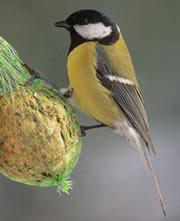City birds raise their tempo
Published online: 4 December 2006; | doi:10.1038/news061204-1Birds change their tune to be heard over traffic.

Birds sing fast and high in London, but slower in the Kolin forest of the Czech Republic.
AlamyIt seems life really is faster in the city — even for birds.Researchers have found that birds living in urban areas sing a faster tune than their slower country counterparts. The changes in birdsong may help their calls to be heard over the howl of traffic and the wind.
The songs of great tits (Parus major) living in ten major European cities were compared with the tunes from those living in nearby forest. All of the city slickers were found to make shorter, faster and more high-pitched sounds, researchers report in Current Biology1.
"Quick, repetitious trills pass better through high wind and the low frequencies of traffic noise," explains Hans Slabbekoorn from Leiden University in the Netherlands. "Whereas low, slower sounds transmit better through dense vegetation."
Changing one's tune to be heard over background noise is not a new phenomenon. Urban nightingales (Luscinia megarhynchos) have been shown to up their volume when the going gets loud. And birds that live near the crash of a waterfall have a higher frequency call than those residing in quieter woodland.
Slabbekoorn's team previously showed that great tits in the city of Leiden had different tunes depending on whether they lived in quiet or bustling areas. That work prompted him to see whether city and country birds were different.
Sound survival
The ability of the male great tit to adapt his repertoire can make a big difference to his life: male birds use sound to defend their territory and to attract females.
"If the birds still used low-frequency sounds in the city, they would lose the ability to communicate," explains Slabbekoorn. "Leaving out lower frequencies seems critical to the bird's ability to thrive."
The expansion of urban landscape makes this area of research important, say scientists. Particularly since it seems that not all birds are so flexible about changing their tune. Zebra finches (Taeniopygia guttata), for example, crystallize their melody in their first months, and so would not be expected to adapt to a new soundscape later in life.
"We have very limited data on all the different species," says Slabbekoorn, about both their ability to adapt their song and their capacity to have stuck it out in the city so far. "We need to know which species have already disappeared from urban areas."
With more information on which birds are sensitive to noise, Slabbekoorn thinks it should be easier to predict some of the consequences of putting roads through nature areas.
ReferencesStory









0 Comments:
Post a Comment
<< Home